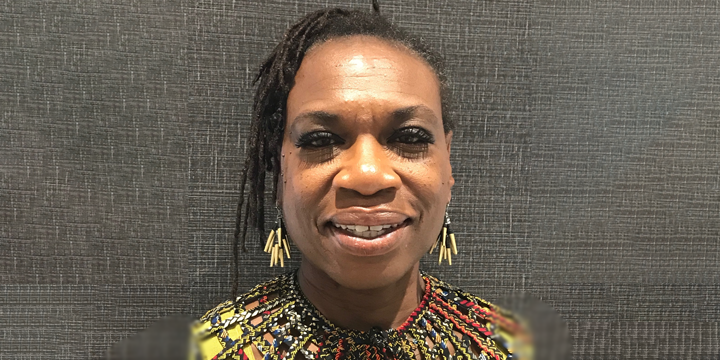We recently had the pleasure of speaking with Regina Everitt, Assistant Chief Operating Officer for Service Excellence and the Director of Library, Archives and Learning Services at University of East London (UEL) about the role of digital learning resources in the future of higher education, and how she feels the sector needs to change.
After completing her Master’s degree in Library and Information Sciences, Regina began her career as a technical author before working in Africa with the Peace Corp and running a small library at a university in West Africa. For the last 20 years, she has focused her attentions on library management in the UK HE sector and is currently leading work on developing institution-wide strategy for customer service delivery at UEL.
1. Given the huge efforts put in across the sector to provide students with digital learning resources during the pandemic, this was still the category that saw the biggest fall in National Student Survey scores. To what do you attribute this?
“We overplay this ‘digital native’ business. We think that just because students use social media on their phones means they can research and retrieve information online, and it’s a completely different skill. I think that was our first mistake in believing that just because students are using social media in innovative ways, that was going to mean they were digitally fluid. It’s a myth, like saying libraries should no longer have books – it doesn’t work.
“I think another key issue is equitable access to technology. We assume everyone has Wi-Fi and well-configured equipment so they can access online resources, spend time doing searches and download material. That certainly didn’t happen. […] If you consider our first year students who were coming from secondary school environments where they had a lot more support to access their resources, the sudden pivot online meant they didn’t have a library building where they could go for help.
“We also have to help our students with their research skills. Critical analysis of material is a real challenge for many students. With Google, as wonderful as it is, students are used to entering a single search term and then having information appear at their fingertips. But, of course, as we know, there are a few steps in between to help you to be able to find the resources that you need.
“And not everyone can absorb information online. Even though [with Kortext] eTextbooks you can enhance the text and highlight things, not every platform is that generous. There are some platforms where you’re effectively just looking at a PDF and it makes it difficult for some people to consume materials. So, I think there are a number of reasons why students are struggling and why learning resources took a hit.”
2. In a recent Wonkhe article, Doug Specht, Director of Teaching, Learning and Quality Assurance at the University of Westminster, stated: “This year’s students will not give universities the benefit of the doubt when it comes to online learning.” To what extent do you agree with this and what does the sector need to do to improve student satisfaction?
“I’ve not read the full article but what I can guess from that statement is that students are saying ‘okay, you’ve had a year, but now you need to do better’. When we did the quick pivot in March 2020, we did a lift and shift. We took the same content in the same way that we would deliver it face to face and stuck it online. But I think learning technologists, any educator, technical author will realise that you need to adapt your material to the medium. Students expect us to do better.
“Some students will engage well in a face-to-face format better than others. So, students are basically saying they want a choice. They want us to do better and make sure that content is engaging, up to date and accessible, but they also want that space for a conversation with someone face to face, so they can really drill down, ask questions they need to ask and learn from their peers, because that’s a key part of being in any university. I think students will expect us to do better and see an improvement on what we started last year.”

3. 20 years of digital development have been crunched into 6 months, with the library at the forefront. Given what you have recently experienced, how do you see the role of the university library developing over the next 12 months – 5 years?
“Libraries need to continue to collaborate to make sure that we’re continually pushing for subscription or procurement models that are preferred and affordable. That has been the challenge. In the eTextbook market there have been public debates about the licencing and subscription models.
“We need to continue to push to do better there and work toward open access of content because that’s another route we need to help our students to engage with as a way of accessing resources and getting access to current research. I think that advocacy within that space around cost of content is going to be key.
“Also, the library should be advising the institution on procurement of content because we are aware of some suppliers who go directly to academic departments. That’s not an efficient or cost-effective way of financing resources. So, the future is about managing the cost of resources, developing content and enabling access to resources for all of our partners, both nationally and internationally.”
4. If you rubbed a bottle and a genie popped out granting you three wishes to change higher education, what would those changes be?
“I’d like to see more diversity in leadership, and our students need to see people who look like them in those leadership roles. That will let them feel like there’s a place for them in the academy and encourage them to continue to research and ask those questions that haven’t been asked. If they’re feeling that there aren’t people who look like them, they won’t feel like it’s a path for them.
“The other thing we need to do is look across our universities and consider if certain black, Asian or marginalised communities are being encouraged into certain types of institutions. If that’s the case, what are the implications there? Is it planned? Is it a good thing? Is it segregation of some sort and how do we feel about that? I’m not making a judgement at this point, but I think it’s something we need to start debating and looking at as a sector.
“Finally, I think more equitable availability of resources. As we know, some institutions have better access to resources than others as they have deeper pockets. As a result, if students aren’t accepted to those institutions, they may attend institutions that don’t have access to that range resources. And what are the implications? What does that say about offering people a level playing field? So, I think we need to pay attention to that divide – the haves and have nots.
“We want to make sure that as many of our young people as possible have choices about whether they want to go into higher education or whether they want to go directly into work – but they should be given equitable access to resources and opportunities, rather than being concentrated in a few institutions.”

